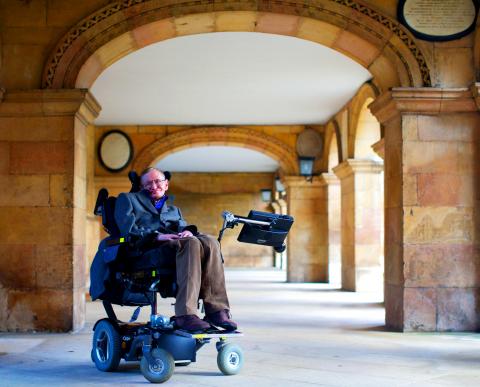Renowned British physicist Stephen Hawking, who sought to explain some of the most complicated questions of life while himself working diligently under the shadow of a likely premature death throughout his life, died at 76 at his home in Cambridge, the UK, on Wednesday morning.
Hawking’s formidable mind ceaselessly probed the very limits of human understanding both in the vastness of space and in the bizarre sub-molecular world of quantum mechanics, which explains how the smallest particles in the universe function and through its theoretical elaboration, according to Hawking, could predict what happens at the beginning and end of time.
By bringing together the theory of relativity, which explores the nature of space and time, and quantum theory, Hawking focused in his academic works on explaining the creation of the universe and how it is governed.

Photo: AFP
照片:法新社
In 1974, Hawking was admitted to Britain’s most prestigious scientific body, the Royal Society, and became one of its youngest fellows at the age of 32. Five years later, Hawking moved from Oxford University to Cambridge University to study further theoretical astronomy and cosmology. Cambridge University appointed him as Lucasian Professor of Mathematics, a prestigious post of which the previous holders include Newton.
Throughout his life, Hawking worked on studies ranging from the origins of the universe to the tantalizing prospect of time travel to the mysteries of space’s all-consuming black holes.
But the power of his intellect contrasted cruelly with the weakness of his body, ravaged by the wasting motor neurone disease he contracted at the age of 21.
Hawking was confined for most of his life to a wheelchair. As his condition worsened, he had to resort to speaking through a voice synthesizer and communicating by moving his eyebrows. The disease spurred him to work harder but also contributed to the collapse of his two marriages, he wrote in a 2013 memoir My Brief History.
In the book he related how he was first diagnosed: “I felt it was very unfair — why should this happen to me,” he wrote. “At the time, I thought my life was over and that I would never realize the potential I felt I had. But now, 50 years later, I can be quietly satisfied with my life.”
Hawking shot to international fame after the 1988 publication of A Brief History of Time, one of the most complex books ever to achieve mass appeal, which stayed on the Sunday Times bestseller list for no fewer than 237 weeks. He said he wrote the book to convey his own excitement over recent discoveries about the universe.
“My original aim was to write a book that would sell on airport bookstalls,” he told reporters at the time. “In order to make sure it was understandable I tried the book out on my nurses. I think they understood most of it.”
(Reuters, with additional reporting by staff writer)
知名的英國物理學家史蒂芬·霍金,週三早上在英國劍橋的家中過世,享壽七十六歲。終其一生,霍金試圖解開最為複雜艱深的生命之謎,自己卻同時面臨著英年早逝的可能,一輩子在死亡的陰影下孜孜矻矻地從事研究。
霍金以令人敬畏的卓越才智,不斷探索著人類理解程度的最極限,範圍大至廣闊無垠的宇宙,小至量子力學中奇異的次分子世界。量子力學理論解釋了宇宙中最小粒子的運作模式,因此他認為,推演這個理論,將能預測時間在最初的起始點與終點各會發生什麼現象。
藉著結合量子力學以及探討空間與時間關係的廣義相對論,霍金在學術著述中聚焦於對宇宙起源以及運行規則提出解釋。
一九七四年,霍金以三十二歲之齡當選英國皇家學會院士,成為英國聲譽最為崇高的科學研究機構中最年輕的研究者之一。五年之後,他從牛津大學遷往劍橋大學,以進一步深入研究理論天文學以及宇宙科學。翌年,霍金獲劍橋大學授予盧卡斯數學教授的頭銜,該席位是物理學者的最高榮譽,獲頒此頭銜的歷任教授還包括牛頓。
霍金畢生的研究領域包含探討宇宙的起源,廣而擴及到誘人的時間旅行可能性,乃至於在太空中吞噬一切的黑洞之謎。
只是,霍金的非凡才智卻和身體上的衰弱形成殘酷的對比。二十一歲時,他被診斷出罹患運動神經元疾病,從此飽受病痛折磨,身體逐漸衰弱。
霍金大半輩子的行動都受輪椅所限制。隨著病情惡化,他被迫仰賴語音合成器來說話,並且藉由眉毛動作來進行溝通。他在二○一三年出版的回憶錄《我的簡史》中表示,這個惡疾驅使他更戮力從事學術研究,卻也造成兩次婚姻的失敗。
在回憶錄中,霍金提及當年第一次被診斷出罹病的感受:「我感覺這非常不公平──為什麼這疾病要發生在我的身上」。他寫道:「那時,我以為我的生命就此結束,不會再有機會實現我自認擁有的潛能。不過,從五十年後的今天看來,可以說我已經對生命感到相當滿足。」
一九八八年出版的《時間簡史》,讓霍金瞬間獲得國際間的崇高聲望。《時間簡史》可說是廣獲大眾青睞的書中最為艱澀難懂的一本,卻在《星期日泰晤士報》的暢銷書排行榜上一待就是兩百三十七週。霍金說,他寫這本書的目的其實是想傳達近年來關於宇宙的新發現對自己帶來的興奮感。
「我原本的目標是想寫一本會被放在機場書架上賣的那種暢銷書。」霍金那時這麼跟記者解釋。「為了確定這本書可以讓人看得懂,我讓照顧我的護理師們都試讀過,我想他們能夠了解書中絕大部分的內容。」
(台北時報章厚明編譯)

If you think you’re cool and know all the latest trends, then here’s a question for you: What does the word “brat” mean? If you said something like, “a child who behaves badly or is annoying or rude,” you might not be as hip as you think. This four-letter word now has a new definition that has become quite popular. Its popularity caught the eye of Collins Dictionary, which crowned it as “Word of the Year 2024.” According to this new meaning of brat, it is used as an adjective to describe someone who has a confident, independent, and hedonistic

A: Seeing as the 2025 Michelin Guide extended to New Taipei City and Hsinchu City and County, it’s hard to believe that none of the restaurants won a Michelin star. B: Some fine establishments — like Hsinchu’s A Cut steakhouse — surely deserve the honor. A: Michelin-starred restaurants have good quality food, but some of them are so pricey. B: I once had barbeque pork at a starred restaurant that set me back NT$4,800. That’s even higher than my weekly food budget. A: No wonder several of them have closed down recently, as high prices and the tariff war are scaring off

★ Bilingual Story is a fictionalized account. 雙語故事部分內容純屬虛構。 “Get in. It’s pouring.” She slid into the back seat, drenched and silent. “Tissues?” the driver asked. “No, thank you,” she said. Water beaded off her hair, ran from her coat, and made a small lake on the vinyl. She kept her head down, long black strands clinging to her face. “Where to?” She gave an address. “Funeral?” he asked as they slipped into the Xinhai Tunnel, rain fading to a hollow drum. She glanced up, puzzled. “No. Why?” “Crematorium’s about the only thing here.” He caught her eyes in the mirror.

Continued from yesterday(延續自昨日) https://www.taipeitimes.com/News/lang Interestingly, one of the words Collins Dictionary discarded was selected by Oxford University Press (OUP) for its own Word of the Year. On its Web site, the publishing house of the University of Oxford stated it had conducted a public poll in which over 37,000 people participated. The voters, along with OUP’s language experts, settled on the term “brain rot.” One main reason for the decision was the vast amount of interest in the noun during 2023 and 2024, with its usage increasing by 230 percent. In fact, brain rot is not a new term by any